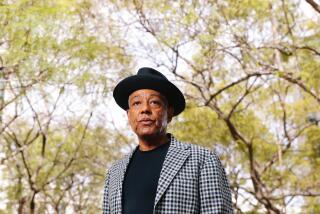PJ Harvey and John Parish’s artistic marriage
- Share via
Musicians Polly Jean Harvey and John Parish don’t believe in compromise, but they do believe in marriage -- a creative union in which ideas must be 100% agreed upon by both parties. It might sound laughably utopian for traditional matrimony, but that philosophy has yielded the near-perfect artifact of an album in “A Woman a Man Walked By,” released this week.
Prickly, wicked and tender, the 10-song collection sounds wrenched from mythical landscapes and the fiery imbroglio of the id. It surely will stand as one of the year’s best rock efforts.
The two British toughs split the work in an orderly way: Parish writes all of the music, and Harvey pens the lyrics and vocals. The set-up allows her to focus on her favorite task, she explained in a rare interview with both musicians in Hollywood before their mesmerizing El Rey show last week.
“Over the years, I’ve become more interested in writing words than anything, really,” said Harvey, spider-black hair falling in tendrils around her shoulders. “So to be in a situation where that’s all I have to take care of, to really explore what I can do with my voice, is a joy for me.”
Harvey and Parish have collaborated before, on 1996’s critically acclaimed “Dance Hall at Louse Point,” and in the nearly 15-year gap between albums, the two artists also have helped each other birth solo projects. Parish co-produced (with Flood) Harvey’s 2007 album “White Chalk”; Harvey appears on “Airplane Blues” from Parish’s 2002 release “How Animals Move.”
The two also cut their teeth in the late ‘80s experimental band Automatic Dlamini.
For “A Woman a Man Walked By,” Parish focused on setting just the right tone. “I didn’t want to put any constrictions on myself while I was writing. I wanted the door to be as open as possible. In some songs, I had absolutely no idea how or where [she] should start singing.”
Fortunately, Harvey was game for such challenges. Tracks such as “Pig Will Not” and the title song initially struck the singer as “impenetrable,” but she discovered a way into them using vocal experimentation. “I settled upon those approaches, literally and vocally, because it was convincing to me. . . . I found ways of singing that I don’t feel like I’ve uncovered before.”
It was paramount, the musicians said, to head to unexplored territory, whether the snappish petulance of “Pig Will Not,” the mud-splattered blues-rock of “Sixteen, Fifteen, Fourteen” or the desolate magic of “Leaving California.” Parish conceived the latter song on a steel guitar, but it didn’t coalesce for him until he switched the time signature. Harvey then built on Parish’s broken waltz rhythms with eerily graceful vocals about missing England in California’s relentless sunshine.
Despite their long-running collaboration, the two find it difficult to describe the chemistry that makes them a fierce pair. When asked to name some of her compatriot’s strengths, Harvey bristled. “It’s a horrible question to be asked when you’re sitting right next to the person,” she said, while Parish cringed in laughter. “Obviously we have deep trust and respect. And that’s a very rare thing.”
With trust comes the ability to lacerate each other; neither spares the other from sometimes harsh truths. That brutal honesty informs their songs, which often aim their most corrosive sentiments at lovers, current and former, lending the music a raw, kinetic energy.
“We’re also able to handle each other’s savage criticism of each other’s work,” Harvey said, “whether together or solo. And I think those are the strengths that we continuously have and continuously need.”
--
More to Read
The biggest entertainment stories
Get our big stories about Hollywood, film, television, music, arts, culture and more right in your inbox as soon as they publish.
You may occasionally receive promotional content from the Los Angeles Times.










